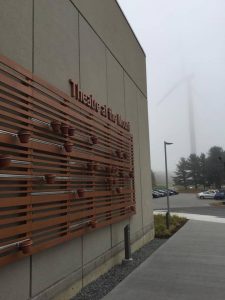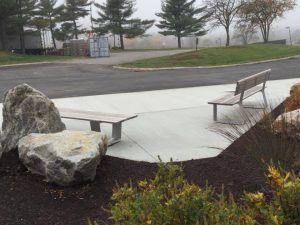By Mariah Boisvert | Observer Contributor
Over the past year MWCC has undergone some major construction with the addition of the new science building and renovations in the main building.







By Mariah Boisvert | Observer Contributor
Over the past year MWCC has undergone some major construction with the addition of the new science building and renovations in the main building.







By Rebekah Chiasson | Assistant Editor

Democratic operative, Robert Creamer, stepped down from his position at Democracy Partner and Scott Foval was fired on October 18, just two days before the third and final presidential debate, due to the release of an undercover investigative video from James O’Keefe.
O’Keefe’s Veritas Project, a non-profit dedicated to uncovering dishonesty, corruption, waste and fraud in public and private cooperations, released its latest investigative video project claiming illegal activity from the Clinton campaign. MWCC student and Trump supporter, Jack Korman says, “Honestly, I don’t even care about Creamer and Foval, I am more worried that the mainstream media is barely covering it.”
One of the most talked about questions of this election year for Massachusetts is Question 4: Legalization, Regulation, and Taxation of Marijuana. A “yes” vote on this question would, “allow persons 21 and older to possess, use, and transfer marijuana concentrate (including edible products) and to cultivate marijuana, all in limited amounts, and would provide for the regulation and taxation of commercial sale of marijuana and marijuana products.” A “no” vote would keep the laws on marijuana in Massachusetts the same as they are now. So let’s take a deeper look into what the “Regulation and Taxation of Marijuana Act,” the “Marijuana Tax,” and the “Regulation of Use and Distribution of Marijuana NOT Medically Prescribed.”
The Regulation and Taxation of Marijuana Act
The purpose of this act is to control the production and distribution of marijuana. The act works on a system that licenses, regulates, and taxes businesses involved. The system is very similar to that of businesses that deal with Alcohol. It would allow adults over the age of 21 to purchase, and even grow a limited amount of marijuana. The act would have its own advisory board, the “Cannabis Advisory Board.” The board would make recommendations on the regulation of marijuana. The Cannabis Advisory Board would consist of 15 board members assigned by the governor. There would be one expert on marijuana cultivation, one expert in marijuana retailing, one expert in marijuana product manufacturing, one expert in marijuana testing, one board member or officer of a medical marijuana treatment center, one registered medical marijuana patient, one person to represent recreational marijuana consumers, two experts in public health, two experts in law enforcement, two experts in social welfare/justice, and two attorneys with experience with marijuana related cases. Each member will serve a term of two years. The members will not be paid for their work, but they will be reimbursed for expenses they run into while performing advisory board duties.
Marijuana Tax
One of the major arguments in favor of legalization is the potential tax revenue the state would gain. The excise tax for the sale of marijuana and marijuana products would be 3.75% of the total price of the sale. However, on top of that, each city or town has the right to impose its own sales tax on top of that of up to 2%. This collected tax revenue could be used towards things like improving our education system, and the infrastructure around the state.
Regulation of the Use and Distribution of Marijuana NOT Medically Prescribed
In this section, we’ll go over the different regulations, and limitations that will be put into place if legalization is passed. Just like alcohol and guns, marijuana will have its own rules and requirements. These are some of the major limitations: Much like alcohol, it will be illegal to operate any sort or heavy machinery/ motor vehicles under the influence. Also the consumption of marijuana would be illegal on the public or private grounds of any educational facility where grades 1 through 12 are taught, and any negligent conduct would be treated very similarly to that of the current public intoxication laws. A marijuana dispensary will not be permitted to open within 500 feet of a school serving grades K through 12.
As far as regulation goes, here are some of the major points. Marijuana establishments could pay up to $3000 for the application to become a licensed dispensary. If their application is accepted, the license itself will cost the owners another $15,000 to obtain. Dispensaries will be require to have certain security measures as well. This includes actual security guards, specific lighting, video and alarm requirements, and secure storage for the marijuana. There will be random testing of samples of marijuana to ensure that all marijuana is labeled, and advertised correctly. There will be restrictions on the advertising to marijuana to avoid being attractive eto children. There are also a few rules for the personal use of marijuana. An individual may have up to 10 ounces of marijuana in their person residence, but may only purchase 1 ounce at a time.
For more information on the legalization of recreational marijuana, please read the Massachusetts Information for Voters 2016 Ballot Questions booklet that is free, and given to every registered voter.
The Humanities Project at MWCC is in its third year with events that can be attended throughout the year.
The project started in 2014, and is funded by the National Endowment for the Humanities (NEH) to enhance humanities programs at MWCC. The grant is up to $500,000, which is matched 50 cents on every dollar raised.
According to the pamphlets scattered around the building every year, Henry David Thoreau was chosen because he considered himself a scientist and a poet. Last year’s theme was Frankenstein by Mary Shelley, but it didn’t just focus on the book. It also focused on the science of the monster and even psychology. This year’s theme is Imagining Work that shows how artists, writers, and photographers viewed work in the 19th century.
The project’s co-chairs are Professor Michelle Valois, Professor Lorie Donahue, and Professor Susan Blake. The administrator is Dean Laurie Occhipinti. Donahue and Blake referred to Valois as their “fearless leader.”
Every school year, they work hard to come up with a theme that is going to be relevant in other classes, not just humanities and English, but science and maybe even history. The theme is decided by surveys students, faculty, staff, and even the community can take part in. The chosen theme comes with events throughout the semester that students, faculty, and the community can attend, either at MWCC or local libraries.
To raise money for the project, a fundraiser is hosted at Wachusett Mountain where contributors hike the mountain, which raises about $6,000 a year. This will be their third year for this fundraiser to take place. The project has also gotten $240,000 in anonymous donations. The money spent each year has been approximately $8,000.
Professor Blake also wanted to give credit and thanks to the LaChance Library for their help in providing “theme-related materials, creating research guides, and promoting events.”
The Adult College Experience Club is looking to reach out to Mount Wachusett Community College’s non-traditional student population. While this club started out as a program within the college, it has expanded into a means for seasoned non-traditional students to mentor incoming non-traditional students.
This club is for measure of helping to ease the anxiety of these students while entering into the college experience. Co-Advisors to the club are Melissa Sargent and Sarah Dorsey. While they hope that students will find the club fun and engaging, their overall goal is to be available to help.
They hope to be able to host workshops relevant to this population of students. These workshops would be offered at no cost to the students. Some topics that may be covered include: how to balance life and school, juggling methods for study when you have children, resume writing, etc. Additional topics would be decided by the members of club as to represent what is they feel is necessary to their experience and challenges undertaking college.
Since a great deal of non-traditional students have an inflexible and sometimes challenging schedule, the ACE Club has additional options to the standard club meetings. “Life happens,” explains Melissa Sargent, which they began looking into these alternate meeting options. The Club is going to launch a virtual meeting tool to its members.
“This variation in club meetings will allow students from not only the Gardner campus to participate, but the Leominster, Devens, and Web students as well,” Melissa Sargent explained. Not only will the meetings allow for students who have a web camera and microphone to actively participate, the meetings will be recorded so that students who could not watch at the scheduled time, can view at their own availability. The club will encourage its members to participate in the discussion via Facebook as well.
With “National Non-traditional Students Week” coming up, November 7th – 11th, the ACE Club is recruiting new members as they currently do not have their Officer positions filled. There first meeting will be held in the North Café at the Gardner campus on November 17th at 5pm. This meeting will be launching the new technology for a virtual meeting. Sargent encourages students who are available to come to campus for the meeting to do so, as it will not be solely a virtual experience.
By Jason Greenough | Web/Social Media Editor
“Comics on a Mission”, a night of stand-up comedy to support veteran students at MWCC, will be hitting the stage on Saturday, October 29th, at The Theater At The Mount.
The event, with all proceeds going to supporting veterans on campus, will be hosted by Brockton native Comedian Will Smalley, and headlined by Boston Comedy vet and legend Tony V, who will be joined by a number of fellow Bay State comics including Andrew Mayer (son of MWCC Director of Veteran Services, Bob Mayer), Kate Procyshyn, and MWCC student Brian Dickens, who a lot of you may know, even if he is taking a semester off from classes here at the Mount. Dickens, a greenhorn when it comes to bringing his unique brand of stand-up to the stage, has always found himself comfortable in the spotlight, and for him, this opportunity, which was granted to him as an award at a stand-up contest in the spring, is no laughing matter.